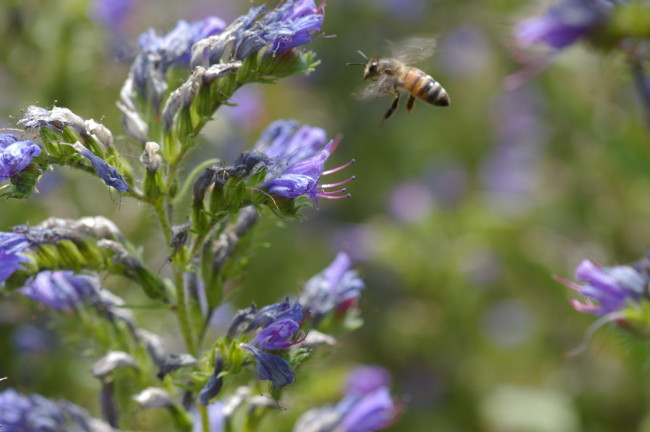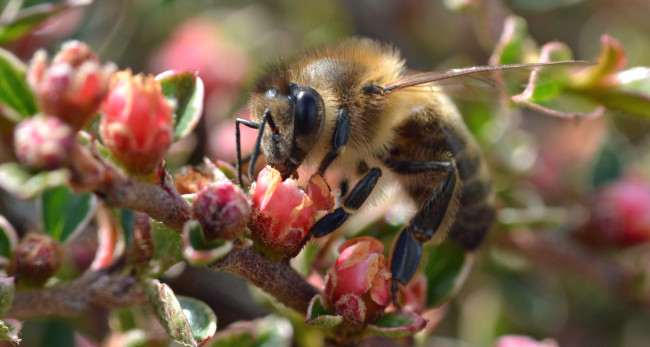
Without bees we would be in big trouble. They are an important link in the food chain, with pollination responsible for more than $200 million per year in agricultural production. They also have an impact on approximately one third of the food we eat and it’s estimated that 80 per cent of the world’s major crops benefit from honeybee pollination. But now, they need our help more than ever.
Beginning this summer, Langara College in Vancouver is launching the first “Sustainable Urban Beekeeping” certificate program to entice the next generation of beekeepers and reinvigorate already established apiculturists. With a worldwide collapse in pollinators (bees and other insects) and consequently pollination, the program offered at Langara couldn’t be more appropriate.
“We won’t go hungry without bees, but our meals will be less flavourful, less nutritious and less interesting,” says program instructor Brian Campbell, founder of Blessed Bee Apiary. “A spaghetti meal without bee-pollinated crops would be a plate of plain noodles, no tomato sauce, no basil or most other spices.”
According to Campbell, between 1993 and 2009, B.C. lost half of its beekeepers because of people quitting the industry or retiring.
Meeting the challenges of sustainability and adapting to changing conditions like new diseases and pests is a difficult one, so there is a definite need and opportunity for new beekeepers to get into the field.
The Langara Continuing Studies College Certificate Program in Sustainable Urban Beekeeping will focus on organic solutions to common beekeeping problems while providing hands on learning opportunities in a guided setting. For instance, last May Langara installed two new honeybee colonies on campus.
“No other beekeeping program in Canada combines lessons in honey bee management with native bee conservation as an integral part of achieving a college certificate,” says Campbell. “There are lots of beekeeping programs but none that I know of that put beekeeping into a larger ecological framework to promote pollinator diversity as well as how to keep honey bees sustainably using organic management techniques.”
Creating that sustainable beekeeping practice requires a system that’s not dependent on chemical controls.
“The certificate program is not only an education in keeping honey bees but also gives techniques and instruction in managing and conserving non-honey bee species,” says Campbell. “This is unlike any other program currently available.”
The proper handling of bees is an important aspect of beekeeping, which is why the course will provide students with 12 hours of field experience. They will spend time in the hives, build their confidence and learn to manage bees.
“Bees are beautiful and intriguing creatures,” says Campbell. “Even though the honey bee is the most studied insect in the world there is still a lot to learn and discover about them. Bees, even after years of working with them, of studying them and teaching about them, continue to amaze and delight.”
In January 2016, Kwantlen Polytechnic University will also introduce a commercial beekeeping program that will provide graduates with the skills they need by November 2016 to establish, manage and grow up to 300 hives or assist in existing beekeeping operations.
With only 45,000 commercial bee colonies in B.C., in recent years, Vancouver, Richmond, North Vancouver, Burnaby and Delta have all changed their bylaws to allow beekeeping as it has gained in popularity and necessity.
Learn more about Langara’s new certificate program.
Bee Facts
- Queen bees normally live between one and four years; they consume royal jelly provided by worker bees. Without a queen bee, a colony will die.
- Bees do not hibernate but cluster for warmth and remain active all winter.
- Apitherapy refers to the medicinal use of honeybee products.
- Honeybees produce honey, pollen, propolis, royal jelly and beeswax, all of which are used by people for nutrition, to bolster the immune system, to treat ailments, in skin care and general healing.
Brian Campbell is a certified beemaster and beekeeper. He is heavily involved in food security issues in Richmond and the Lower Mainland and is President of the Richmond Beekeepers Association, a BC Association Master Gardener, Sustainable Gardening and Bee Master to West Coast Seeds, and offers classes in grafting fruit trees, food preserving and other farm skills. Contact Brian at www.thebeeschool.ca




